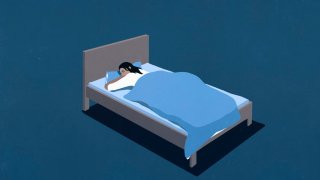
As emergency medicine doctors, we clock in and out at all hours, making it tough to get enough rest.
Physicians also come from a culture where boasting about getting by on little or no sleep is common or even boasted about. But we want to push back on that idea.
Sleep is fundamentally important to physical, mental and emotional health. Meanwhile, sleep deprivation contributes to chronic conditions like depression, obesity, diabetes and strokes.
Here are eight things that help us wake up refreshed every day:
Get Connecticut local news, weather forecasts and entertainment stories to your inbox. Sign up for NBC Connecticut newsletters.
1. Minimize light in the room
Darkness promotes relaxation and stimulates the brain's production of melatonin, a hormone that helps regulate our circadian rhythm.
Blackout curtains or shades are effective mimickers of darkness, and a comfortable eye mask does the same trick. Remember to turn off or dim devices that give off light.
Money Report
2. Decrease the temperature
Sleep and body temperature are linked. As our temperature drops while we sleep, a cooler room allows for a consistent body temperature so we stay asleep longer.
Extreme cold or heat is not a great idea, as these environments are sleep disruptive. Neither shivering nor sweating are particularly relaxing or comfortable.
3. Avoid eating close to bedtime
Going to sleep on a full stomach is not good for digestion and is associated with acid reflux.
My colleagues and I try to eat on shift, a few hours before we anticipate sleeping. We opt for room temperature or warm drinks (e.g. water herbal, caffeine free tea, like chamomile) instead of late night snacking.
4. Take a warm bath or shower
We shower and bathe before going to sleep after a shift. You would too if you saw and felt the dirt, germs, and sweat on the skin from the emergency department and patient care spaces.
Baths and showers help sleep quality by decreasing the body's core temperature, signaling to the body that it's time for sleep.
5. Pick a calming scent
We love lavender and eucalyptus. The science shows that lavender oil is relaxing and is effective as a sleep aid.
The same is true for eucalyptus oil, which has an added sinus clearing property that helps people who experience congestion at night. Spray it lightly on your chest, neck, or pillow to capture the scent.
6. Integrate an exercise routine
Regular and daily exercise helps sleep no matter the time of day. Intensive cardiovascular exercise less than one hour before you go to bed is disruptive to deep sleep.
At night, just before bedtime, use light, slow exercise that will fatigue your muscles, but won't stimulate your heart rate and make you break a sweat.
7. Use sound conditioning
Smartphone apps, a fan, or a white noise machine are called sound conditioners. Although Resa prefers ambient noise, they work for many people. Adaira enjoys the app Rain Rain Sleep Sounds.
The concept is that a blanket of noise or background sound covers noises or disruptive sounds that may cause intermittent arousal and disruptive sleep.
8. Sleep on a comfortable mattress
We recommend a mattress that allows spine alignment and body relaxation. The mattress, bedding, and clothing you wear to bed all contribute to your body temperature. You should feel comfortable and dry.
Restful and consistent sleep is a struggle for many people, and we hope that these tips can help you find a routine that works for you.
Adaira Landry, MD, MEd, is an assistant professor of Emergency Medicine at the Harvard Medical School and Brigham and Women's Hospital. She is also the co-founder of WritingInColor.org, and co-author of "MicroSkills: Small Actions, Big Impact."
Resa E. Lewiss, MD, is a Professor of Emergency Medicine at the University of Alabama at Birmingham, creator host of The Visible Voices Podcast, and co-author of "MicroSkills: Small Actions, Big Impact."
Want to land your dream job in 2024? Take CNBC's new online course How to Ace Your Job Interview to learn what hiring managers are really looking for, body language techniques, what to say and not to say, and the best way to talk about pay. CNBC Make It readers can save 25% with discount code 25OFF.
Plus, sign up for CNBC Make It's newsletter to get tips and tricks for success at work, with money and in life.






